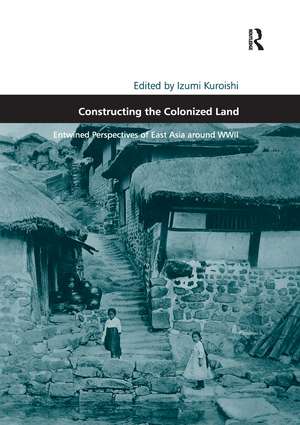Constructing the Colonized Land: Entwined Perspectives of East Asia around WWII
Editat de Izumi Kuroishien Limba Engleză Paperback – 11 oct 2016
| Toate formatele și edițiile | Preț | Express |
|---|---|---|
| Paperback (1) | 324.16 lei 6-8 săpt. | |
| Taylor & Francis – 11 oct 2016 | 324.16 lei 6-8 săpt. | |
| Hardback (1) | 825.21 lei 6-8 săpt. | |
| Taylor & Francis – 28 feb 2014 | 825.21 lei 6-8 săpt. |
Preț: 324.16 lei
Preț vechi: 424.45 lei
-24% Nou
Puncte Express: 486
Preț estimativ în valută:
62.03€ • 64.94$ • 51.32£
62.03€ • 64.94$ • 51.32£
Carte tipărită la comandă
Livrare economică 07-21 aprilie
Preluare comenzi: 021 569.72.76
Specificații
ISBN-13: 9781138248977
ISBN-10: 1138248975
Pagini: 286
Dimensiuni: 174 x 246 mm
Greutate: 0.45 kg
Ediția:1
Editura: Taylor & Francis
Colecția Routledge
Locul publicării:Oxford, United Kingdom
ISBN-10: 1138248975
Pagini: 286
Dimensiuni: 174 x 246 mm
Greutate: 0.45 kg
Ediția:1
Editura: Taylor & Francis
Colecția Routledge
Locul publicării:Oxford, United Kingdom
Notă biografică
Izumi Kuroishi is at The Aoyama Gakuin University, Japan.
Recenzii
'This volume is useful for those interested in the intersections of colonialism, urbanism, regionalism, and modernity. The essays provide a new lens through which to think through space, the built environment, and contested heritages in East Asia. Izumi Kuroishi should be commended for seeing this volume to completion (post-earthquake and tsunami of 2011) and curating such a diverse array of papers that are insightful, interesting, and that open up new venues of inquiry and epistemologies into the ways in which we might consider colonial modernity and its impact on the urban fabric, infrastructure, and imaginings.'
Equinox
'This book represents a major effort to delineate these complex, nuanced relationships by examining the production of architecture and urban space from the perspectives of different actors and institutions in the first half of the twentieth century.'
Cecilia L. Chu, The University of Hong Kong
Equinox
'This book represents a major effort to delineate these complex, nuanced relationships by examining the production of architecture and urban space from the perspectives of different actors and institutions in the first half of the twentieth century.'
Cecilia L. Chu, The University of Hong Kong
Cuprins
Introduction, Izumi Kuroishi; Chapter 1 A Study of Japanese Colonial Architecture in East Asia, Yasuhiko Nishizawa; Chapter 2 Recentering the City: Municipal Architecture in Shanghai, 1927–1937, Cole Roskam; Chapter 3 Scholarship and Political Identity: Asianism in Tadashi Sekino’s Survey of Chinese Heritage before 1935, Xu Subin; Chapter 4 Transplanting State Shinto: The Reconfiguration of Existing Built and Natural Environments in Colonized Taiwan, Akihito Aoi; Chapter 5 From Political Governance and Spatial Restructure to Urban Transformation and Architectural Achievements: Discourse on Architecture in the Japanese Colonial Period, 1895–1945, Chao-Ching Fu; Chapter 6 Macau’s Urban Transformation 1927–1949: The Significance of Sino-Portuguese Foreign Relations in the Urban Form, Paula Morais; Chapter 7 Colonial Modernity and Urban Space: Seoul and the 1930s Land Readjustment Project, Junichiro Ishida, Jooya Kim; Chapter 8 On Park Kil-ryong’s Discovering, Understanding, and Designing of Korean Architecture, Woo Don-Son; Chapter 9 Domesticating Others’ Space: Surveys and Reforms of Housing in Chosen and Japan by Wajiro Kon, Izumi Kuroishi;
Descriere
Examining colonized cities in East Asia, this book brings together a range of different perspectives across both space and time. European, Chinese, Taiwanese, Korean and Japanese discourses are examined, with a range of complementary and conflicting views on the design of urban and architectural forms; the political, institutional, religious and economical contexts of urban planning; the role played by various media; and the influence of various geographical, social and anthropological research methods. The diversity and plurality of these perspectives in this book provides an entwined architectural, urban and social history of East Asia, which offers insights into the cultural systems and the historical and spatial meanings of these colonized cities.
